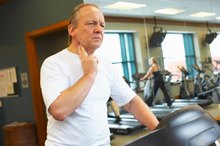Lymph nodes are a part of your immune system. The immune system protects you from infection and other diseases. It includes your spleen, bone marrow, thymus, tonsils, adenoids, the lymph channels and the lymph nodes. Lymph nodes are in the neck, behind the ears, under the jaws and chin, under the armpits and in the groin. Exercise is a key factor for the proper function of the lymph nodes and the circulation of the lymphatic fluid throughout the body.
If you are experiencing serious medical symptoms, seek emergency treatment immediately.
Functions of the Lymph Nodes
Lymph nodes are rounded masses of lymphatic tissue encapsulated in a connective tissue. They play important functions in helping your immune system defend your body against diseases. Lymph nodes filter lymphatic fluid, and produce and store white blood cells. A tender, swollen lymph node is usually a sign of infection. It also means that the lymph nodes are working harder to produce more white cells to defend against the infection.
- Lymph nodes are rounded masses of lymphatic tissue encapsulated in a connective tissue.
- It also means that the lymph nodes are working harder to produce more white cells to defend against the infection.
Lymphatic Fluid Circulation
Why Does Your Heart Beat Fast When You Exercise?
Learn More
Lymphatic fluid circulates through the lymph vessels that pass between the muscles of your body. Unlike the heart that pumps blood through the blood vessels, lymph vessels are blind-ended. They travel in only one direction and have no pump to move and circulate lymph throughout the body. Instead, lymph vessels are squeezed by your muscles when you move. Therefore, exercise plays a vital role in lymphatic fluid circulation.
- Lymphatic fluid circulates through the lymph vessels that pass between the muscles of your body.
- Instead, lymph vessels are squeezed by your muscles when you move.
Effects of Exercise
Exercise has many benefits, including stimulation of the lymphatic system. The lymphatic system depends on physical activity to circulate the lymphatic fluid throughout the body, and collect and help the body eliminate toxins and other waste products. Vigorous exercise and actions such as coughing, sneezing and abdominal contractions on forceful exhalation will aid the flow of lymphatic fluid 3.
Exercises to Improve Lymphatic Circulation
Workout Routine if You Have High Blood Pressure
Learn More
Any form of exercise, such as:
- walking
- climbing stairs
- swimming
- running
- dancing or playing tennis
- will stimulate the lymphatic system
- improve the lymphatic circulation
Deep breathing exercises will benefit the flow of lymphatic fluid because of the pressure deep breathing creates in the chest and abdominal cavities along with the contractions of the diaphragm and abdominal muscles.
Related Articles
References
- Medline Plus: Swollen Lymph Nodes
- MayoClinic.colm: Swollen Lymph Nodes
- CBS News: Exercise on the Rebound
- Randolph GJ, Ivanov S, Zinselmeyer BH, Scallan JP. The Lymphatic System: Integral Roles in Immunity. Annu Rev Immunol. 2017;35:31-52. doi:10.1146/annurev-immunol-041015-055354
- Choi I, Lee S, Hong YK. The new era of the lymphatic system: no longer secondary to the blood vascular system. Cold Spring Harb Perspect Med. 2012;2(4):a006445. doi:10.1101/cshperspect.a006445
- Cancer Research UK. The Lymphatic System and Cancer.
- Lu M, Munford RS. The Transport and Inactivation Kinetics of Bacterial Lipopolysaccharide Influence its Immunological Potency in vivo. Journal of immunology (Baltimore, Md: 1950). 2011;187(6):3314-3320. doi:10.4049/jimmunol.1004087.
- Mingozzi F, Spreafico R, Gorletta T, et al. Prolonged contact with dendritic cells turns lymph node‐resident NK cells into anti‐tumor effectors. EMBO Molecular Medicine. 2016;8(9):1039-1051.
Writer Bio
Norma Chew is a retired registered nurse who has been a freelance writer since 1978. Chew's articles have appeared in the "Journal of the Association of Operating Room Nurses" (AORN), "Point of View Magazine" and "Today's OR Nurse." Chew has a master's degree in health care administration from Nova Southeastern University.









